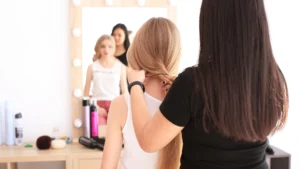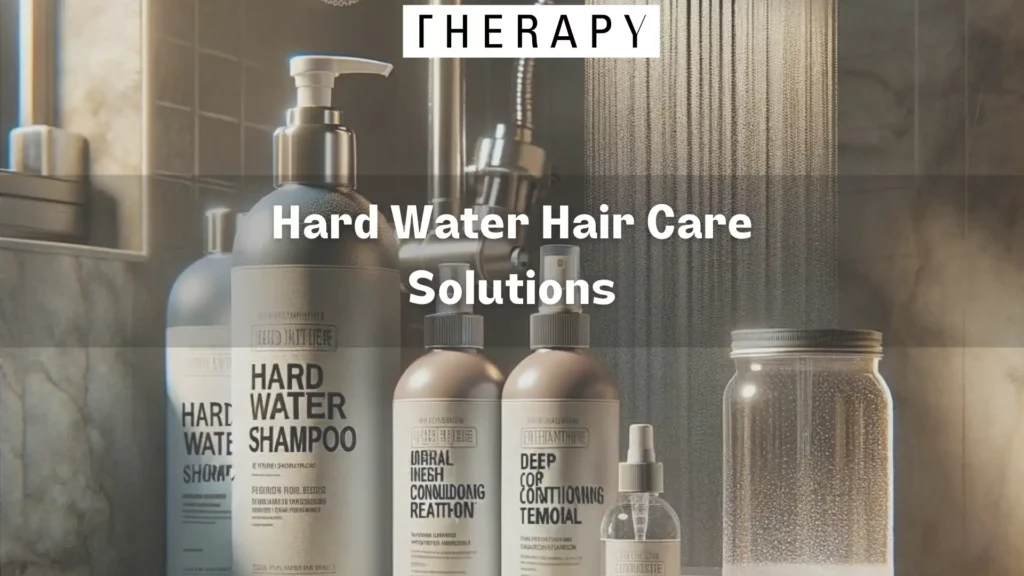Hard Water Hair Care Solutions
Is hard water wrecking your hair? Water softeners in your home may not be enough to prevent breakage, dry hair, or discoloration of colored hair. If you live in an area with hard water, you’ve probably seen the damage its sediment does to your faucets and other plumbing fixtures, but just think – is all that gunk in your hair, too? Here’s a quick guide on hard water hair care solutions that you can use to fix your damaged hair.
If you’re frustrated with dry, damaged hair, your hard water could be to blame. Our hard water hair care solutions can help you tame the frizz and get the healthy, shiny hair you desire.
What Is Hard Water?
Hard water is water with high levels of minerals, like magnesium and calcium, and heavy metals. It leaves sediment in plumbing pipes and shower heads. The minerals and metals in hard water can react with the material of pipes and plumbing fixtures, damaging them.
Those minerals and metals also build up in your hair, even if you shampoo it daily or several times a week. If you have hard water, your hair probably is more damaged than it should be and may not respond to color or heat treatment as well as healthy hair would.
Does Hard Water Damage My Hair?
Yes, and the damage may be worse the higher the calcium level is.
Let’s get scientific: Hard water disrupts the skin barrier, including on the scalp. Calcium can affect the protective skin barrier, causing dehydration. Hard water may strip away the protective oils on the scalp, excessively drying your hair. You may see dandruff or dry, flaky skin on your head or itchy, irritated patches.
Not only does hard water dehydrate your hair and scalp, but it also leaves a film behind. If you color your hair, the minerals in hard water cause brassiness in blonde and yellow tones. The same result can occur if you use a relaxer or perm your hair. The minerals and heavy metals interfere with the chemical treatments.
The result? “Winter hair” all year round: dry flyaway strands, unmanageable frizz, and faded color.
What Are Signs of Hard Water Damage?
It’s tricky to tell what damage is caused by hard water and what may be caused by dry winter weather or over-treating your hair. Dry air and cold winter temperatures can make your scalp drier (and create unsightly flakes) and your hair frizzier.
The shampoo you use could affect your color, especially if you are not using products formulated for color-treated hair. Or, if you over-wash your hair or use heat styling excessively, you could dry the strands and your scalp.
A telltale sign of hard water damage to your hair is a film, like a feeling that your hair isn’t clean enough, even if you’ve just washed it. When the calcium in the water mixes with chemicals in shampoos, it creates this scummy film, and the shampoo can’t do its job. Calcium troubles don’t stop with shampoo. The filmy buildup prevents your conditioner from penetrating the hair shaft and smoothing the cuticles, so it’s less effective.
Protecting Your Hair from Hard Water
 What kind of hair care for hard water can fix the frizz? A water softener or a special hard water filter for your showerhead can help. Using gentle shampoos that don’t strip away the moisture barrier of the scalp can reduce the effect of hard water and calcium. Look for hydrating hair products to help protect each strand from damaging calcium and magnesium.
What kind of hair care for hard water can fix the frizz? A water softener or a special hard water filter for your showerhead can help. Using gentle shampoos that don’t strip away the moisture barrier of the scalp can reduce the effect of hard water and calcium. Look for hydrating hair products to help protect each strand from damaging calcium and magnesium.
An acidic rinse or purifying and clarifying shampoo can break up the scummy shampoo-hard water buildup. Look for products with a chelating agent or ingredient, which can remove mineral buildup and heavy metals from your hair and scalp. You can also rinse your hair with apple cider vinegar. But if you color your hair, especially blonde, ask your colorist first before putting vinegar on your ‘do.
Purifying shampoos and chelating shampoo rinse aids should only be used once per week, maybe less, if your stylist recommends that. These products lift the minerals from your hair but can leave it prone to dryness. Follow the purifying shampoo with a deep conditioner treatment or a hydrating hair masque to restore moisture.
Can a Professional Stylist Help with Hard Water Damage?
Yes! Many salons offer deep-conditioning treatments, which can help smooth the cuticles of your strands and invigorate your scalp so that it can produce more protective oils. Your stylist may have hard water hair care solutions for your hair type or shampoos and conditioners to use at home. They may also have tips for caring for your hair between shampoos, like heatless styling options that reduce damage to already-dry hair. Call the pros at Therapy Hair Studios today to schedule an appointment with a stylist.
Related Posts:
What is a Scalp Treatment and Why Do Them?
Hair Care Basics: How Often You Should Shampoo and Condition Your Hair






